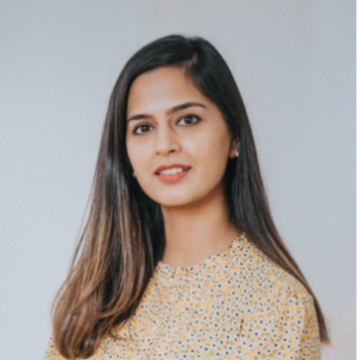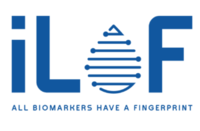Dr Mehak Mumtaz, co-founder and COO of Intelligent Lab on Fiber (iLoF)

Dr Mehak Mumtaz is co-founder and COO of Intelligent Lab on Fiber (iLoF), a platform using artificial intelligence and photonics to build a cloud-based library of diseases biomarkers and biological profiles, and provide screening and stratification tools in an affordable, fast, portable way. Established in 2019, with funding from EIT Health, Microsoft-M12 and Mayfield Fund, iLoF is incubated at the Oxford Foundry with R&D operations based at the University of Porto.
What is your background? What made you decide to become an entrepreneur?
I came to Oxford from Pakistan as an undergraduate to study biochemistry, followed by a DPhil in Pathology at the Dunn School. At the end of my DPhil, I found myself thinking about and exploring other opportunities at the intersection of technology and life sciences. I had joined a translational biology lab at the Dunn School and although my DPhil was in basic discovery research, during my postdoc, I had my first introduction to the commercialisation lifecycle and drug discovery.
At the same time, I realised that I wasn’t well-suited for an academic research pathway, even though I loved the intellectual stimulation and independence it afforded. Oxford is a hotbed of innovation, and a lot of the activities driving the life sciences revolution are at the intersection with technology. Getting involved with the Oxford innovation scene lit another spark, and then a role came along to manage an innovation project funded by EIT Health at Oxford. This was my turning point; I was building relationships with stakeholders across academic centres, hospitals and technology industry partners to improve outcomes for patients. I loved combining my academic background with a commercial mindset and getting to plan projects and wear many different hats. I also participated in the L.E.V8 Women programme at the Oxford Foundry and Idea to Impact at the Saïd Business School. Both helped me to build my network and get a taste of taking an idea to the next level.
After this innovation role, I decided to get hard commercial experience as a strategy consultant at EY-Parthenon. During this time, iLoF gained a place on the EIT Health ‘Wild Card’ initiative, which provided resources, training and a 10-week programme to validate the idea with industry experts. At the end of the initiative, we secured a €2 million investment from EIT Health, set up the company and committed to the venture full-time since.

An entrepreneur is someone who identifies a need that existing businesses have not been able to solve, determine a solution for that need, and gather together a team and resources to create that possibility into a reality.
How and when did you know your idea was good enough to develop it?
The EIT Health programme involved speaking to over 100 stakeholders across pharma, healthcare and technology space in order to validate our idea. When people started to put their names on a piece of paper, we knew we were on to something – there’s no better validation.
What would you say are the top 3 skills that needed to be a successful entrepreneur? Why?
Firstly, communication. As an entrepreneur, you need the ability to sell a story that explains where you are and where you are going to go. Secondly, the team is really what drives the company, so you need to hire effective people, to gain access to new skills, at the same time building as company culture. You need to hire people who you can really trust – building a business is hard. Finally, you need to hustle and be relentless in the face of setbacks (and there will be many setbacks)! This is easier when you have a ‘north star’ – when you’re passionate and purposeful about what you’re doing.
What is your favourite part of being an entrepreneur?
It’s being able to bring together a team to create cutting edge technology to solve a real problem and create a global difference. We’re driven by our mission to change the current paradigm of drug discovery.
I also love the sheer breadth of activities that comes with being an entrepreneur. Every day is different; I might be wearing my science hat, interviewing a potential hire or designing a pitch deck, all in the span of a day.
What individual, company, or organization inspires you most? Why?
Craig Venter! He laid the foundation for sequencing and drug discovery based on genomics and has continued to make scientific breakthroughs.
If you had 5 minutes with the above individual/ company/organization, what would you want to ask or discuss?
I’d love to ask how he has been able to go against the grain and defy public perceptions – especially in science, but also as an entrepreneur. Also, I want to know how he combines his ambitions and big visions with reality.
What would you say have been some of your mistakes, failures, or lessons learned as an entrepreneur?
You need to validate your ideas. Unless you go around and speak to people, you won’t know whether there’s a need in the market. We initially started off with something completely different but were questioned about whether there was really a need for it, as part of the EIT Health programme.
How have you funded your ideas?
We secured €2 million investment from EIT Health as part of the Wild Card programme in July 2019, and in July 2020 we secured $1 million from M12 and Mayfield after winning Microsoft’s Female Founders Competition for Global Deeptech startups.
Are there any sector-specific awards/grants/competitions that have helped you?
The first boost was EIT Health Wild Card, both in terms of funding and the training from the programme. We’ve since won lots of awards: the Microsoft Female Founders Competition which led to more investment, the Altice Innovation Award gave us incredible recognition in Portugal and we’re shortlisted for the FT/IFC Global Transformational Business Awards. Most recently, we were named as a top 150 digital health company by CB Insights, which is super exciting as it puts us on the map with companies who are top of the top in digital health.
What is good about being an entrepreneur in Oxfordshire? Bad?
Oxford University has one of the best research ecosystems and there’s lots happening – it’s a hotbed for tech, biotech and healthcare startups. There’s also an extensive support network in Oxford, such as the Foundry, Oxford University Innovation (OUI) and the Oxfordshire Local Enterprise Partnership (OxLEP). Oxford Sciences Innovation (OSI) has really changed the landscape for spinouts too.
On the other side, it has the same challenges as most other areas: access to funding, especially for ventures that aren’t spinouts; and diversity. Less than 20% of spinouts have a female founder, and those ones don’t receive as much money. There’s also a lack of BAME representation.
Oxford also has a high cost of living, which you have to balance with the ease of finding talent here.
If a new entrepreneur or startup came to you looking for entrepreneurship resources, where would you send them?
To the Oxford Foundry. We’re incubated at the Foundry, and many of our clients and most of our mentors have been through the Foundry. We’ve accessed personalised mentoring and training, and I’ve built many of my networks through Foundry programmes.
Have you faced any challenges as a woman entrepreneur? If so, how have you overcome them?
I haven’t faced any conscious biases, but there are certainly personality traits that can hold women back. I think that we often focus on getting something absolutely perfect before jumping in, but that can be a detriment. Everyone is making things up! So really, it’s all about taking the first step and then about good old-fashioned hard work and sacrifice. From my time in strategy consulting, I learnt to just make a decision to the best of my ability.
Imposter syndrome is also very prevalent in high-achieving environments such as Oxford and entrepreneurship.
Do you have any advice for other women who want to be entrepreneurs?
Say ‘yes’, or at least make a habit of challenging yourself whenever you’re thinking of turning something down. There is always a myriad of reasons to decline an opportunity – too much on your plate, not feeling ready – but one yes can make all the difference. If I had turned down the EIT Health opportunity, I would not be where I am today.
Women could also do a better job of pitching themselves, not just in entrepreneurship but in any career. This is something I learnt at the WE ACE programme from Innovation Forum Oxford: women don’t really put their best self forward and don’t negotiate as much.
Also, find mentors who can show you the ropes and help you to build networks. I’m continuously learning from my mentors – they’re people who have ‘been there’ and can give you perspective.
What resources would you recommend for other women?
One of the biggest resources is other women! I’m a firm believer that we should always be supporting each other to take risks and try out different things. Find programmes and networks that you can be a part of, such as the RisingWise, or Oxford Foundry programmes. These networks don’t have to be all-female, although women’s networks do have a different energy. Find people who are a bit ahead of you in the journey or doing different things to you.
Any last words of advice?
Define your personal version of success and think about what you’re aiming towards. Then every day that you’re moving towards that goal is a success.
Share this
More news



